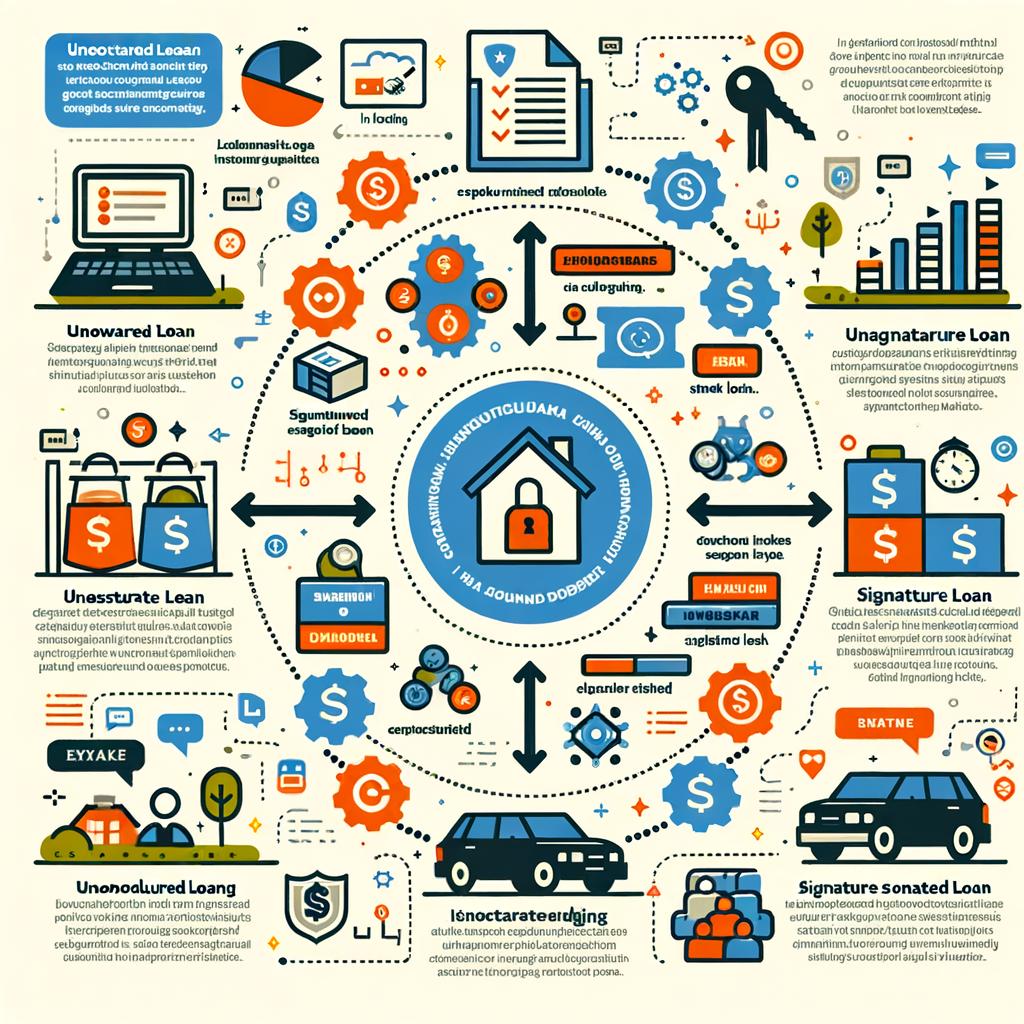Picture this: You’re standing at a financial crossroad, dreams in one pocket and needs in the other. Suddenly, the conventional options seem limiting, almost as if they carry the weight of your great-grandparents’ worn-out ledger books. Enter the signature loan—a modern-day financial tool that promises convenience with the flourish of your pen. But before diving headfirst into the world of unsecured borrowing, it’s worth pausing to understand what makes a signature loan tick. In this article, we’ll unravel the mechanics behind signature loans, exploring how they can become a lifeline to your financial aspirations with simplicity and ease. Whether you’re a savvy borrower or a curious newcomer, journey with us as we decode this intriguing loan option, one signature at a time.
Table of Contents
- Understanding the Basics of Signature Loans
- Unsecured Lending: How Signature Loans Differ from Other Types
- The Application Process: Steps to Secure a Signature Loan
- Weighing the Pros and Cons: Is a Signature Loan Right for You?
- Q&A
- Final Thoughts

Understanding the Basics of Signature Loans
A signature loan is a type of personal loan that doesn’t require any form of collateral. Also known as a good faith loan or character loan, it primarily relies on the borrower’s creditworthiness and ability to repay. Banks or financial institutions will often provide these loans if the applicant has a strong credit history and a reliable income source.
One of the main attractions of signature loans is their simplicity. Borrowers don’t need to pledge any assets such as a house or car to secure the loan. Instead, the lender bases the loan approval on the borrower’s signature and promise to repay.
These loans can be used for a wide array of purposes, such as:
- Consolidating high-interest debt
- Covering unexpected expenses
- Making home improvements
- Funding special events like weddings or vacations
Eligibility for a signature loan primarily hinges on three factors:
- Credit score: A good credit score often leads to better loan terms.
- Income: Proof of steady income assures lenders you can repay the loan.
- Debt-to-income ratio: Lenders also consider how much debt you’re currently carrying compared to your income.
In terms of interest rates, signature loans can vary widely based on the lender and the borrower’s credit profile. Typically, they come with higher interest rates than secured loans since there is no collateral to mitigate the lender’s risk.
| Lender | Typical Interest Rate | Loan Term Options |
|---|---|---|
| Bank A | 8-15% | 1-5 years |
| Credit Union B | 6-12% | 1-4 years |
| Online Lender C | 10-18% | 1-6 years |
Once approved, the loan amount is usually disbursed in a single lump sum, and borrowers typically make fixed monthly payments until the loan is paid off. The approval process is often faster compared to other loan types, making it an attractive option for those in urgent need of funds.
Repayment terms also tend to be flexible, with options ranging from a few months to several years. It’s crucial to review the loan agreement carefully to understand the total cost of borrowing, including any fees or penalties for late payments.
A signature loan can be a convenient solution if you have a solid financial track record and need quick access to funds without the hassle of providing collateral. However, it’s essential to compare offers from different lenders and choose the one that best fits your financial situation. With careful planning and responsible borrowing, a signature loan can help manage expenses and meet your financial goals.

Unsecured Lending: How Signature Loans Differ from Other Types
Unlike secured lending, where the borrower needs to pledge collateral, signature loans fall under the category of unsecured lending. The primary differentiator here is that signature loans require no collateral; lenders rely solely on the borrower’s creditworthiness.
One of the standout features of signature loans is their simplicity. Here’s a quick look at how they contrast with other unsecured lending options:
- Credit Cards: Although also an unsecured form of credit, credit cards come with revolving credit limits, whereas signature loans are installment loans.
- Personal Lines of Credit: These are akin to a combination of a credit card and a loan, offering a borrowing limit that can be tapped into as needed but generally with lower interest rates than credit cards.
- Payday Loans: Short-term and often high-interest, payday loans are vastly different from signature loans due to their predatory nature and the small loan amounts typically offered.
What makes signature loans particularly appealing is their predictability. When you take out a signature loan, you know exactly how much you need to repay each month. This is in stark contrast to credit cards, where your monthly payments can vary dramatically depending on your outstanding balance and interest rates.
Another point of differentiation is the application process. Signature loan applications generally involve a straightforward credit check, income verification, and personal identification. Unlike secured loans where you might have to undergo a lengthy appraisal process for the collateral, signature loans are relatively quick to process.
Interest rates on signature loans can vary based on the lender and the borrower’s credit score. Generally, those with higher credit scores will benefit from lower interest rates. Here’s a simple comparison:
| Type of Loan | Interest Rate | Collateral Required |
|---|---|---|
| Signature Loan | 6% – 36% | No |
| Credit Card | 12% - 24% | No |
| Secured Personal Loan | 3% - 10% | Yes |
Given their unsecured nature, signature loans can feature higher interest rates compared to their secured counterparts. This emphasizes the need for good credit as a way to minimize borrowing costs. Lenders use your credit score, borrowing history, and sometimes even your employment status to gauge your ability to repay the loan.
Focusing on accessibility, signature loans tend to have a fixed repayment term, typically ranging from a few months to several years. This fixed term makes them distinct from the revolving credit found with credit cards and personal lines of credit, instilling more financial discipline in borrowers.
it’s crucial to evaluate your financial situation and compare your options before opting for a signature loan. While avoiding the need for collateral is advantageous, ensuring you can manage the fixed monthly payments over the loan term is key. Weigh the benefits and drawbacks to find an unsecured lending option that meets your needs.

The Application Process: Steps to Secure a Signature Loan
Securing a signature loan is straightforward, but requires attention to detail and careful planning. Here’s a step-by-step guide to successfully navigate the process:
1. Research and Compare Lenders
The first crucial step is to research various lenders to find the best loan terms and interest rates. Look for:
- Online reviews and customer feedback
- Interest rates and APR (Annual Percentage Rate)
- Loan amounts and repayment terms
- Any additional fees or charges
It’s worthwhile to compare several lenders side by side:
| Lender | Interest Rate | Loan Amount | Fees |
|---|---|---|---|
| Bank A | 6.5% | Up to $10,000 | No fees |
| Credit Union B | 5.8% | Up to $15,000 | $50 origination |
| Online Lender C | 7.2% | Up to $20,000 | No fees |
2. Check Your Credit Score
Your credit score plays an essential role in qualifying for a signature loan. Higher scores can potentially unlock lower interest rates. Obtain your credit report and review it for any inaccuracies. If necessary, take steps to improve your credit score before applying.
3. Gather Required Documentation
Lenders typically require specific documentation to process your loan application. Prepare the following items:
- Proof of income (pay stubs, tax returns)
- Identification (passport, driver’s license)
- Proof of residence (utility bills, lease agreement)
4. Submit Your Application
After gathering all necessary documents and comparing lenders, it’s time to submit your application. Many lenders offer the convenience of online applications. Ensure that all information you provide is accurate and up-to-date to avoid any delays.
5. Review and Accept Loan Terms
Upon approval, lenders will present you with the loan terms and conditions. Carefully review the interest rate, repayment schedule, and any additional fees. Ask for clarification if anything is unclear. Once satisfied, you can accept the loan terms.
6. Receive Funds and Start Repayment
After accepting the terms, the lender will disburse the funds to your designated account. You can then use the funds as intended. Keep track of your repayment schedule, as timely payments are crucial to maintaining a good credit standing and avoiding late fees.
By following these steps and maintaining diligent financial habits, securing and repaying a signature loan can be a smooth and beneficial process.

Weighing the Pros and Cons: Is a Signature Loan Right for You?
When considering a signature loan, it’s crucial to weigh its advantages and disadvantages. A signature loan, also known as a good faith loan or character loan, is a type of unsecured personal loan that relies on the borrower’s creditworthiness and promise to repay. Unlike mortgages or auto loans, it’s not backed by collateral. But is it the right choice for you?
Pros of a Signature Loan
- No Collateral Required: This means you don’t need to risk any of your assets, like your house or car, to secure the loan.
- Quick Approval Process: With minimal paperwork and no need for asset evaluation, signature loans can be approved swiftly.
- Versatile Usage: Borrowers can use the loan amount for various purposes, from debt consolidation to unexpected expenses or even a vacation.
- Fixed Interest Rates: Signature loans often come with fixed interest rates, which can make budgeting and planning for repayments more straightforward.
Cons of a Signature Loan
- Higher Interest Rates: As there’s no collateral, these loans tend to have higher interest rates compared to secured loans.
- Stricter Approval Criteria: Lenders may require a higher credit score and a strong financial history to qualify.
- Limited Loan Amounts: Without collateral, the loan amounts available are generally lower than what’s available with secured loans.
- Potential for Overborrowing: The ease of access may tempt some into borrowing more than they can afford to repay.
Comparison Table
| Aspect | Signature Loans | Secured Loans |
|---|---|---|
| Collateral Required | No | Yes |
| Interest Rates | Higher | Lower |
| Approval Speed | Faster | Slower |
| Loan Amount | Lower | Higher |
When a Signature Loan Might Be Right for You
A signature loan can be an excellent option if you don’t have valuable collateral to borrow against but have a solid credit score and need quick access to funds. It’s also ideal if you can manage the higher interest rates and need a versatile loan for various personal expenses.
When to Consider Alternatives
If you have poor credit or need a large sum of money, you might want to explore other loan types. Secured loans, for instance, could provide you with lower interest rates and higher loan amounts, albeit at the expense of putting your collateral at risk.
Final Thoughts
Understanding both the benefits and drawbacks of signature loans can help you make an informed decision. Always consider your specific financial situation, needs, and long-term goals before taking on any form of debt. Calculating your monthly payments and total interest over the life of the loan can also provide additional insight into whether a signature loan is the best option for you.
Q&A
Q: What exactly is a signature loan?
A: A signature loan, often referred to as an unsecured personal loan, is a type of loan that doesn’t require any collateral. Instead, it relies solely on the borrower’s creditworthiness and their promise to repay the loan, typically verified through their signature on the loan agreement, hence the name.
Q: How does a signature loan work?
A: The process is relatively straightforward. When you apply for a signature loan, the lender evaluates your credit history, income, and other financial factors to determine your eligibility and the loan amount. If approved, you receive the loan funds in a lump sum and agree to repay the amount, plus interest, over a specified period through fixed monthly payments.
Q: What can a signature loan be used for?
A: The beauty of a signature loan is its versatility. You can use it for almost any purpose, such as debt consolidation, medical expenses, home improvements, or even a big purchase like a wedding or vacation. The choice is yours.
Q: How do interest rates work for signature loans?
A: Interest rates for signature loans can vary widely and are primarily influenced by your credit score and financial history. Generally, the better your credit, the lower the interest rate you’ll be offered. Lenders may provide either fixed or variable interest rates, but fixed rates are more common, offering predictable monthly payments.
Q: What are the main benefits of a signature loan?
A: One of the primary benefits is that it’s unsecured, meaning you don’t have to put up any of your personal assets as collateral. Additionally, the approval process is usually quicker than that of secured loans, and the funds can be used for a variety of purposes.
Q: Are there any drawbacks to consider?
A: Yes, there are potential downsides. Since the loan is unsecured, the interest rates tend to be higher compared to secured loans, especially if you have a lower credit score. Additionally, failing to meet repayment terms can severely impact your credit score and financial health.
Q: Who is eligible for a signature loan?
A: Eligibility criteria can vary by lender, but generally, you need to have a good credit score, a stable income, and a low debt-to-income ratio. Lenders will also consider your employment history and overall financial stability.
Q: How long does the approval process take?
A: The approval process for a signature loan is usually quite fast. Some lenders can approve and disburse funds within a few days, while others might take a week or two. The speed often depends on how quickly you can provide the necessary documentation and the lender’s processing times.
Q: How can one improve their chances of getting approved for a signature loan?
A: Improving your credit score, reducing your existing debt, and ensuring a steady income are key strategies. It’s also helpful to provide complete and accurate information during the application process. In some cases, applying with a co-signer who has a strong credit history can increase your chances of approval.
Q: Is a signature loan right for everyone?
A: Not necessarily. While it’s a flexible and convenient financing option, it’s not suitable for everyone. If you have a lower credit score, you might find the interest rates too high. Always assess your financial situation and compare loan options to determine the best fit for your needs.
This Q&A should provide a comprehensive overview of what a signature loan is and how it works, helping you make an informed decision.
Final Thoughts
As we draw the curtains on our exploration of signature loans, it’s evident that these financial tools can serve as a bridge to achieving your dreams or navigating life’s unpredictable turns. A beacon of simplicity in the often complicated world of lending, signature loans hinge on trust and mutual confidence between you and your lender. Whether you’re consolidating debt, covering unexpected expenses, or financing a personal venture, understanding the intricacies of how signature loans work empowers you to make informed, savvy decisions. So next time you find yourself at the crossroads of financial choice, remember the humble signature loan—a handshake of trust, sealed with a signature, and poised to open doors.
